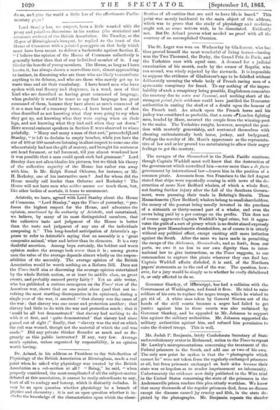Aristotle, we learn, agreed with Lord Stanley about the House
of Commons. "Lord Stanley," says the Times of yesterday, "pro- fesses the highest respect for the House, and advocates the opinion, sanctioned by the authority of Aristotle, and entertained, we believe, by many of its most distinguished members, that the collective taste and judgment of the House is better than the taste and judgment of any one of the individuals composing it." This long-headed anticipation of Aristotle's ap- pears to refer to Aristotle's saying that an assembly is a ' great composite animal,' wiser and better than its elements. It is a very doubtful assertion. Among boys certainly, the boldest and worst opinion makes the average look worse than it is ; among grown men the value of the average depends almost wholly on the respon- sibilities of the assembly. The average opinion of the British Association would be worth nothing on a Reform Bill Does not the Times itself aim at discerning the average opinion entertained by the whole British nation, or at least its middle class, on great events, and probably succeed pretty fairly ? Yet an able writer, who has published a curious monogram on the Times' view of the American war, shows that on one point alone (and that not in- volving the most startling discrepancies in its opinions), during a single year of the war, it asserted " that slavery was the cause of the war ; that slavery was one cause and protection another ; that slavery had little to do with the war and protection much ; that it could be all but demonstrated' that slavery had nothing to do with it at first, and quite demonstrated' that slavery had since passed out of sight ;" finally, that "slavery was the reel on which the coil was wound, though not the material of which the coil was made." Did any private thinker flounder as much and as fla- grantly as this public instructor P If any, very few. Average men's opinion, unless organized by responsibility, is no opinion worth having.






























 Previous page
Previous page